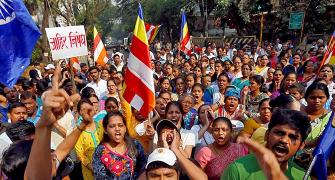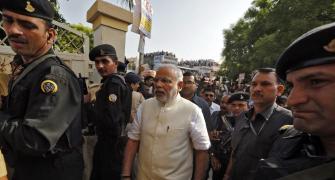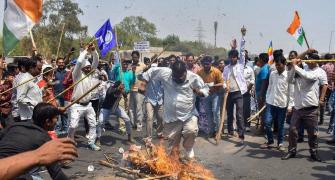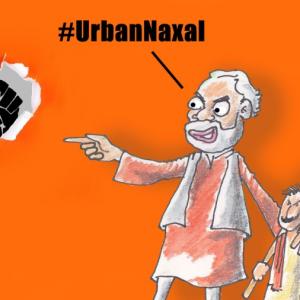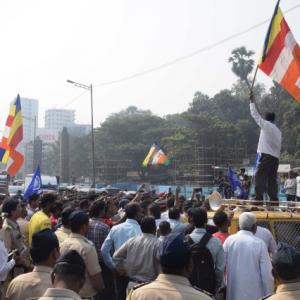'...incarcerated in jails, ruining their entire families.'
'You would see that Dalits who displayed so much agitation over the Bhima-Koregaon issue are effectively silenced by the arrests of their activists by the police.'
'What can be a more pitiable state than this for a people who had just seen a ray of hope after darkness of millennia?'
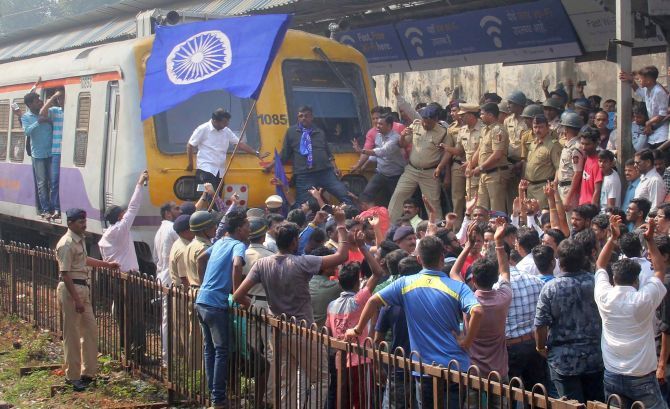
Dr Anand Teltumbde was one of the intellectuals and civil rights activists whose homes were raided by the Pune police on Tuesday, August 28.
Professor Teltumbde was in Mumbai when a Pune police team searched his home in Panaji.
"What reaction shall I give to you? There is nothing. We are not even remotely connected to the allegations that they have been levelling against us," Dr Teltumbde told PTI over the phone from Mumbai.
"Whatever are my opinions, they are in the public domain. What reaction can I offer to you? I cannot even remotely think of such a kind of thing happening to me," Dr Teltumbde added.
What the police were claiming about Maoist links of Left-wing activists is "nonsense", Dr Teltumbde said. "We are not in such kind of business. We are respected people. They are doing nonsense. Most of them (the arrested activists) are human right activists."
"It is natural that they will talk in favour of those people whose rights are violated."
Earlier this month, Dr Teltumbde published his latest book, Republic of Caste: Thinking Equality in the Time of Neoliberal Hindutva.
In the book, he explains how the condition of Dalits has remained more or less the same post-Independence, how various political parties were able to co-opt them from time to time, and how the masses were betrayed by Dalit leaders who benefitted from the concern of the ruling classes for their votes.
"Dalit leaders only have to chant 'Ambedkar' and occasionally mouth abuses on harmless abstractions such as Brahminism, Manu, upper castes and so on in lieu of Dalit concern, to extract their political rent from the ruling classes," Dr Teltumbde told Rediff.com's Syed Firdaus Ashraf in an interview conducted a couple of weeks before the police raid on his home.
The first of a multi-part interview:
After reading your book, it looks like nothing has changed for Dalits in the last 70 years. Their leaders have repeatedly failed them.
If Y B Chavan got Dalit leaders into the Congress, Namdeo Dhasal went to the Shiv Sena and now Narendra Damodardas Modi has got Dalit leaders into his party.
Indeed, the situation of Dalits in India for the last 70 years essentially remains unchanged. This has been somewhat by design as the ruling classes to whom power was transferred in 1947 wanted caste to live on and, in corollary, the victims of caste too.
Unfortunately, nobody cares to look at that.
You habitually keep taking the Constitution as sacrosanct and the founding fathers as angels sans their class/caste politics.
It is unfortunate that such a growing menace of caste and communalism (even) after seven decades (of Independence) doesn't wake up our scholars and intellectuals to smell some rot at the foundation of the Republic itself.
It is not my profession to do all this but, when I took it upon myself to connect all the dots, I found everything falling in place, exposing how the ruling classes systematically served the interests of capitalist classes using pro-people rhetoric.
It is one of the important themes of my book.
When the Communist Party got misled by this carefully constructed rhetoric and took to the parliamentary path, what to speak of Dalit leadership!
After the death of Babasaheb Ambedkar there was not a single leader who could get into his shoes. They wisely constituted a collective leadership in the form of a presidium, but personal rivalries and ambitions of some leaders began cracking it up.
But one must note, it is to the credit of leaders like Dadasaheb Gaikwad who tried to impart proper direction to the party and organised two massive land satyagrahas, the first in 1959 and the second in 1964-1965, that shook the establishment to its bones.
This was very much in deference to the wishes of Ambedkar, but it provided fodder for others to castigate it as anti-Ambedkar because they charged that speaking of land, etc was the method of the Communists.
Shaken by the last land satyagraha, the Congress forged the co-option policy, which was first tried out by Yashwantrao Chavan, by offering none other than Gaikwad a Rajya Sabha seat.
It opened up the floodgates for the vested interests. They just had to chant 'Ambedkar' or 'Dalit interests' and run after greener pastures.
The RPI (Republican Party of India) episode was re-enacted after a decade in the split of the Dalit Panthers.
As you noted, the stormy petrel of the Panthers like Namdeo Dhasal did not have any qualms to sing paeans to Indira Gandhi during her most reactionary phase and thereafter go over to thank Ambedkar-hater Bal Thackeray.
Today, all the Rams (referring to Dalit leaders Ramdas Athawale, Ram Vilas Paswan and Ram (Udit) Raj in one of his Economic and Political Weekly columns) are seen playing 'Hanuman' to the Bharatiya Janata Party.
You mention in your book that Dalits were given reservations to let them live with guilt in Independent India, that they were made to feel guilty of 'stealing jobs in the name of reservations'.
No, I think you got it wrong. What I said is that the reservations to Dalits came in colonial times in the form of the India Act 1935 that incorporated the Poona Pact between Dr Ambedkar and (Mahatma) Gandhi in the political sphere and thereafter in 1943 in public sector employments and educational institutions supported by public funds.
Although not defined in so many words, it was in the spirit of an exceptional measure of social justice for exceptional people.
There was no doubt that Dalits were such people and as such it did not create any bad blood in society.
But after Independence, this innocuous measure was used skilfully to consecrate castes into the Constitution and to link it to the notion of backwardness.
In the colonial system, the reservation policy was instituted on the basis of 'scheduled caste', a novel administrative category, thus snapping its connection with caste itself.
After Independence, the category was adopted, but its lid was opened for the politicians to include and exclude castes, thereby restoring its relationship with caste.
In colonial policy, implicitly, the disability was of Indian society which would not give Dalits their dues, howsoever meritorious they would be.
It followed that in order to do away with such an exceptional policy, the onus belonged to the larger society, which could be motivated to do away with caste so as to avoid this ignominy in a reasonable timeframe.
Dalits would be seen as a wronged people.
In post-colonial times, this implicit logic was completely destroyed. It came out as the magnanimity of society to extend a helping hand to the incapable people called Dalits.
Everything was turned on its head. As the development process induced competition among people, Dalits began to be seen as undeserving usurpers of non-Dalit share.
The policy that was meant to progressively do away social discrimination of Dalits became the means of its persistence.
Republic of Castes explicates this dynamics.
Why are Dalit leaders so vulnerable?
It is not Dalit leaders, but the masses who are vulnerable.
Dalit leaders have to just chant 'Ambedkar' and occasionally mouth abuses on harmless abstractions such as Brahminism, Manu, upper castes and so on in lieu of Dalit concern, to extract their political rent from the ruling classes.
The Dalit masses, however, have to believe in such self-seeking cheats in the hope of amelioration of their worsening lot.
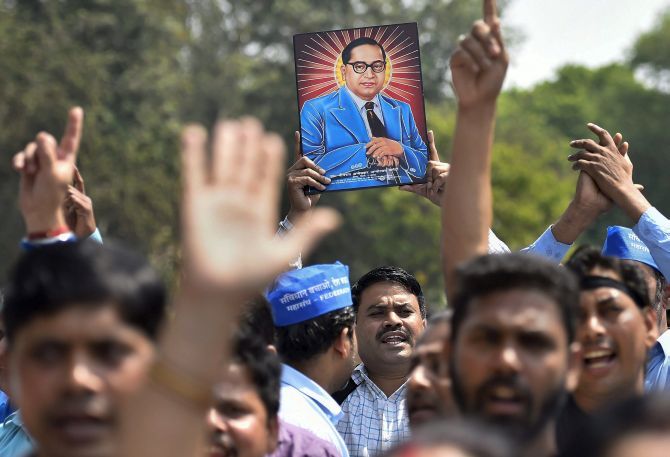
In what way is the condition of Dalits worsening? There are quite a few Dalit teachers in prominent institutions of the country and high-ranked government officials.
Yes, this illusion hides the reality.
It is absolutely true that Dalits have reached every sphere of national life and have even gone abroad to constitute a sizable Diaspora.
A section of Dalits has also come up as Dalit capitalists, claiming that they are no more job seekers but job givers.
All this is good and can be taken as natural progression of all communities.
It is not Dalits alone but all other people also have progressed. The question is how much.
The visible class of Dalits who appear well-off does not count for even 10 per cent of the Dalit population.
The rest 90 per cent are left high and dry, invisible, without hope.
A hundred years ago, when the Dalit movement was taking shape, they had so much of hope. Today, there is none.
In the neo-liberal era, they have been deprived of what little came in their share in terms of developmental inputs.
They have been cut off as rural people from education of any consequence. They do not have any protection of healthcare, do not have any livelihood security.
On the other hand, they are seen as undeserving beneficiaries of reservations.
If they open their mouths in protest, they are labelled as Maoists and incarcerated in jails, ruining their entire families.
You would see that Dalits who displayed so much agitation over the Bhima-Koregaon issue are effectively silenced by the arrests of their activists by the police.
What can be a more pitiable state than this for a people who had just seen a ray of hope after darkness of millennia?
In your book, you attribute atrocities on Dalits as well as the symbolism around Ambedkar to post-colonial developments. Can you explain?
That again is an important theme of the book which nobody speaks about. People are bewildered by the perplexing phenomenon where the ruling parties shower praises on Ambedkar but unleash all kinds of injustice on Dalits.
It is not difficult to see that the former is to woo Dalits into voting for them and the latter is symbolic that they do not want to displease the dominant communities in society that ill-treat Dalits.
What is important is to see that it is rooted in the developmental process followed by the post-colonial rulers.
As I explained in the book, the Congress implemented land reforms in the name of the people, but to create a class of rich farmers in the vast rural tracts and followed it by the capitalist strategy of the Green Revolution.
In the process, the erstwhile upper caste landlords were displaced from villages, their place being taken by the rich farmers belonging to the most populous Shudra castes.
The rising political ambition of this class could not be contained by the Congress and they began to spill out in the form of regional parties or defections, challenging the electoral monopoly of the Congress.
This process brought importance to vote banks and valorisation to castes and communities.
Dalits came to be seen as an important vote bank, that is relatively cheaper and manipulable with the Ambedkar icon.
I have chronologically shown in the book how Babasaheb Ambedkar, who was ignored by the entire ruling establishment, began to be treated as an important icon.
The same capitalist process destroyed the traditional systems of interdependence in villages, reducing Dalits to the rural proletariat utterly dependent on the rich Shudra farmers for wages.
The resultant class contradiction between capitalist rich farmers and Dalit wage labourers flowed through familiar fault lines of caste, giving rise to a new genre of caste atrocities.
- PART 2 of the interview: 'Chanting Ambedkar's name makes Dalit leaders cross over to BJP'

